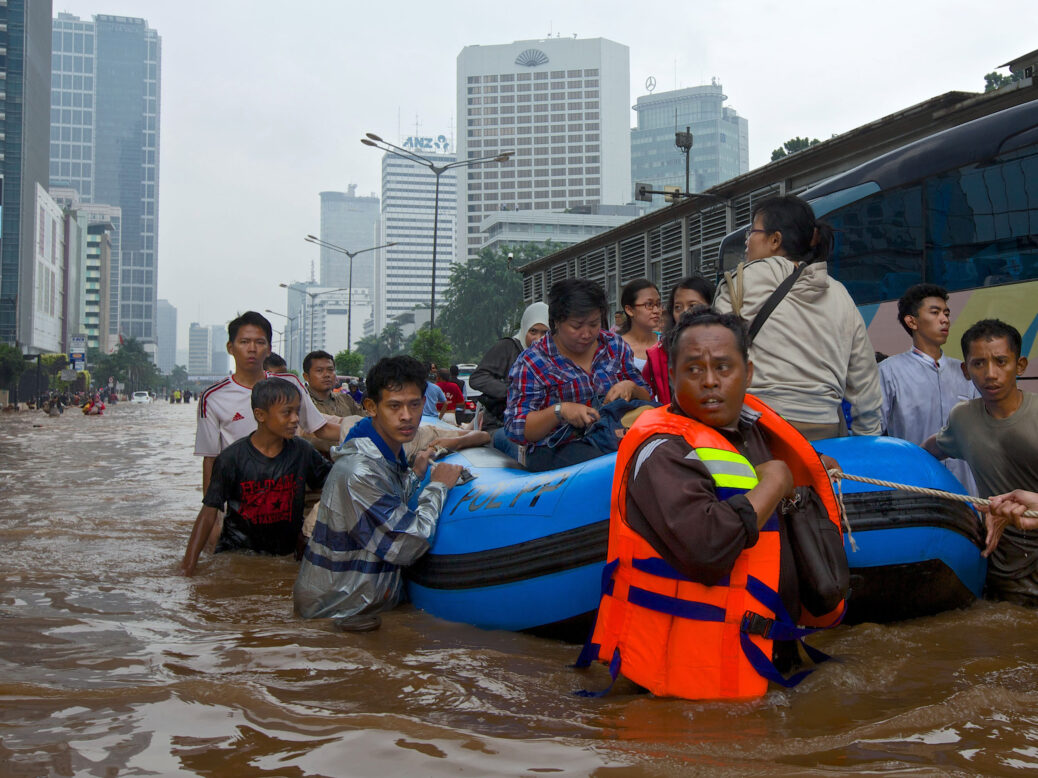
Climate change was once regarded by many as a danger to future generations. But every week evidence accumulates that suggests a crisis unfolding with remorseless speed. In Australia, the ongoing bushfires have impacted an estimated one billion animals and charred an area the size of Ireland. As Ray Monk and Ruth Buckley-Salmon write in an essay this week, Jakarta, Indonesia, has endured its worst floods for a decade, with 66 people killed and 36,000 displaced, while in southern Europe, Storm Gloria has led to the deaths of 13 people and the evacuation of thousands.
Such events are not mere aberrations but the predictable consequence of unprecedented warming: the 20 hottest years since records began in 1850 have occurred in the last 22 years. Past warnings now appear grimly prescient. In 2007, for instance, the UN’s Intergovernmental Panel on Climate Change warned that “in south-east Australia the frequency of very high and extreme fire danger days is likely to rise 4 to 25 per cent by 2020”.
The world has perhaps just a decade left to prevent average temperatures rising by more than 1.5°C above pre-industrial levels – the point at which the risk of irreversible and catastrophic climate change significantly increases. (They are currently 1°C higher.) Yet at present, even if every country met the targets they have set for reducing carbon emissions, the world would be 3°C warmer by 2100.
Boris Johnson has vowed that the UK will be an exception. In his general election victory speech on 13 December, the Prime Minister promised “to make this country the cleanest, greenest on Earth, with the most far-reaching environmental programme” and committed to a target of net-zero emissions by 2050. This represents a marked change in tone by Mr Johnson. As recently as 2015, he wrote in the Daily Telegraph that “global leaders were driven by a primitive fear that the present ambient warm weather is somehow caused by humanity; and that fear – as far as I understand the science – is equally without foundation”.
One has cause to doubt the sincerity of his apparent conversion. On 4 February, former Conservative minister Claire O’Neill, who was removed as president of the upcoming UN climate change summit in Glasgow, said that Mr Johnson had “admitted to me he doesn’t really understand it [climate change]” and said that a cabinet subcommittee on the climate conference had not met since it was established.
At first sight, the UK’s climate record is impressive. Carbon emissions are now 38 per cent lower than in 1990 – the largest reduction of any major developed country – but progress is already faltering. Far from achieving the lofty ambition of net-zero emissions by 2050, the UK is forecast to miss its carbon targets for 2023 to 2027 by 5.6 per cent and for 2028 to 2032 by 9.6 per cent. As the world’s sixth-largest economy and its first industrialised power, the UK has a special responsibility to address the climate crisis. This is less a matter of altruism than of self-interest. Though the cost of climate change will fall most heavily on the world’s poorest, no country can escape the consequences of a burning planet.
Ireland’s difficulty
Ever since the 2016 Brexit vote, Irish republicans have believed, as the 19th-century nationalist leader Daniel O’Connell put it, that “England’s difficulty is Ireland’s opportunity”. On 3 February, their hopes were partly fulfilled when Sinn Féin topped an Irish opinion poll for the first time (with 25 per cent of the vote), ahead of the general election on 8 February. Brexit, and the planned imposition of a border between Northern Ireland and the rest of the UK, have revived republican hopes of a united Ireland.
But as Ailbhe Rea and Megan Nolan write in this week’s issue, Sinn Féin’s advance owes less to nationalism than to deep discontent over more conventional political issues: the economy, housing and health care. This offers harsh lessons for the incumbent Fine Gael and opposition Fianna Fáil, which have dominated Irish politics for nearly a century but delivered economic catastrophe (the 2008 Irish crash) and a decade of punitive austerity. As established parties across Europe are learning to their cost, faced with radical problems, voters will abandon the mainstream and seek radical solutions.






